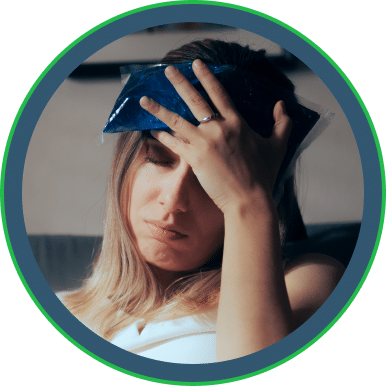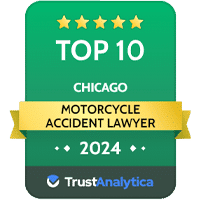
A car crash head injury requires immediate attention. This article will help you identify the types of head injuries, recognize their symptoms, and understand the urgent actions needed after the accident.
Key Takeaways
- Car crashes can cause various head injuries, including concussions and traumatic brain injuries (TBIs), which require immediate medical attention for effective treatment.
- Recognizing symptoms such as confusion, headaches, and dizziness is crucial, as delayed diagnosis can lead to serious complications.
- Implementing safe driving practices, such as avoiding distractions and wearing seat belts, significantly reduces the risk of head injuries in car accidents.
Your search for help ends here. Let’s get started, for FREE.
Understanding Car Crash Head Injuries
Car accidents can result in severe head injuries, often leading to significant medical and personal impacts. The sudden jolt or blow to the head during a car crash can cause traumatic brain injury (TBI), a serious condition with potentially lasting effects. Motor vehicle accidents can exacerbate these issues.
Recognizing the types and symptoms of these injuries sets the stage for effective treatment and recovery.
Types of Head Injuries from Car Accidents
Head injuries from car accidents can vary widely in type and severity. Concussions, caused by a bump, sudden movement, or blow to the head, are among the most common. These injuries often result from the rapid acceleration and deceleration of the brain inside the skull during a crash, leading to symptoms like headaches, confusion, and dizziness. Contusions, or brain bruises, occur from direct impacts and can cause severe headaches.
Traumatic brain injuries (TBIs) span a range from mild traumatic brain injury to severe, life-altering damage. Closed head injuries, where the skull remains intact, and open head injuries, involving skull penetration, represent different mechanisms of trauma. Identifying these types of injuries helps determine the appropriate medical response.
Common Symptoms of a Head Injury
Head injury symptoms can appear immediately or be delayed, necessitating constant vigilance. Common immediate symptoms of a traumatic brain injury include confusion, memory loss, blurry vision, and dizziness. For concussions, many concussion symptoms like headaches, dizziness, memory loss, and light sensitivity may appear shortly after the accident.
Symptoms of a concussion often go undiagnosed, which can lead to complications if not addressed. Diffuse brain injuries, which affect the brain more broadly, can result in a decreased level of consciousness. Awareness and prompt medical attention can prevent more severe concussion outcomes.
Immediate Steps to Take After a Head Injury in a Car Accident
If you suspect a head injury after a car accident, taking immediate action is paramount. The first step is to seek proper medical care to assess the severity of the injury and address any severe head injury symptoms.
When to Seek Emergency Medical Attention
Some symptoms require immediate medical attention. Severe headaches, confusion, or loss of consciousness warrant an immediate trip to the emergency room. Ignoring these signs can result in dangerous complications like excessive bleeding or blood clots.
Obtaining medical attention after any potential head injury is crucial to avoid serious or life-threatening side effects. If unusual symptoms occur, do not hesitate to seek emergency medical support. Taking immediate action can significantly alter outcomes.
Initial Medical Evaluation
When you arrive at the emergency room, doctors will quickly assess your condition to determine the extent of the injury. Letting the medical team know the injury resulted from a car accident ensures a thorough evaluation. The initial assessment includes checking for physical indicators like bruises or lacerations.
Neurological assessments play a key role in the examination process. Doctors may also order CT scans to detect severe brain injuries such as bleeding or fractures. These steps clarify the injury and guide subsequent treatment.
Suffered a Car Crash Head Injury?
Diagnosing and Treating Car Crash Head Injuries
Diagnosing and treating head injuries from car crashes involves several steps, from initial tests to advanced treatment options. Accurate early diagnosis is key for effective treatment and minimizing long-term impacts.
Diagnostic Tests and Procedures
Doctors begin with a physical exam to identify lacerations, bruises, or other signs of trauma. Various tests, including imaging tests like CT scans, neurological exams, and cognitive assessments, help determine the severity of the injury. The Glasgow Coma Score (GCS) is often used to assess a patient’s level of consciousness, with scores categorizing head injuries as mild, moderate, or severe.
These diagnostic tools are essential for crafting an effective treatment plan.
Treatment Options
Treatment for head injuries can vary widely. For mild traumatic brain injuries, rest and medication are typically recommended. Patients are often advised to gradually reintroduce moderate physical and mental activities after the initial 48 hours of rest.
In severe cases, surgery may be necessary. This could involve repairing skull fractures, addressing bleeding vessels, or removing hematomas. Intensive care, overseen by neurointensivists, is crucial for patients with severe TBIs. The aim is to support critically ill patients and reduce secondary brain injury. If initial tests are inconclusive, further evaluations like EEGs or MRIs may be needed.
Recovery and Rehabilitation
The journey to recovery from a head injury requires patience and support. Rehabilitation plays a critical role in helping patients regain their abilities and improve their quality of life.
Short-term and Long-term Effects
Concussion symptoms may last from days to weeks, and sometimes longer. These symptoms can impact brain function and overall health, even if they initially appear mild. Post-concussion syndrome can lead to prolonged physical and psychological challenges.
Untreated concussions can result in permanent brain damage. Survivors of brain injuries may face lasting effects on their physical and mental abilities, emotions, and personality. Recovery depends on factors like the brain’s plasticity and the patient’s efforts.
Family involvement is crucial, as well as providing emotional support and helping the patient navigate their experiences.
Support Systems and Resources
Support groups provide valuable resources for patients and families, offering:
- Emotional support
- Shared experiences
- Information about available treatments
- Recovery strategies
Utilizing support systems can significantly aid in the recovery process.
Effective rehabilitation programs include physical, occupational, speech therapy, psychiatric care, and social support tailored to individual needs.
Social workers assist families in preparing for discharge or transfer to rehabilitation. These resources are essential for a successful recovery journey.
Legal Considerations
Knowing the legal aspects of head injuries from car accidents is vital for securing compensation and support. Filing an injury claim and working with a personal injury lawyer can help you navigate this complex process.
Filing an Injury Claim
Seeing a doctor after a car accident creates a medical record of your injuries, essential for supporting your injury claim. Medical records provide the necessary evidence to prove that your injuries were caused by the accident. Documenting all medical treatments is crucial when filing an injury claim for a concussion.
Compensation for a concussion may cover various expenses, including vehicle repairs, medical bills, and lost income. If you are not at fault for the accident, you have the right to file a personal injury claim against the other driver. The value of an injury claim varies widely based on the circumstances and severity of the injury.
Working with a Personal Injury Lawyer
Consulting a personal injury lawyer provides invaluable guidance and support when dealing with the aftermath of a brain injury from a car accident. A lawyer can navigate complex legal processes, ensuring that no important deadlines are missed.
Specialized legal representation is essential as these lawyers understand the medical and legal nuances of brain injury cases. Legal advocacy ensures fair compensation and eases the burdens of recovery and financial concerns.
Prevention Tips
Preventing head injuries in car accidents involves adopting safe driving practices and protective measures. Proactive measures can significantly reduce the risk and severity of injuries.
Safe Driving Practices
Avoiding distractions like mobile devices while driving enhances road safety and reduces accident risks. Texting, eating, or any other distractions can significantly increase the likelihood of accidents. Maintaining a safe following distance can also prevent rear-end collisions.
Teen drivers and new drivers should be especially cautious, as they are more prone to distractions and inexperience-related errors. Avoiding blinding bright lights and maintaining focus on the road can significantly prevent accidents.
Protective Measures
Consistent use of seat belts can greatly reduce the likelihood of head injuries during car accidents. Proper use of child safety seats is essential for minimizing risks to younger passengers.
Avoiding driving under the influence of alcohol or drugs is vital for safe driving habits. Driving under the influence or when drowsy raises the chance of making errors on the road.
These preventive measures are simple yet effective in protecting against severe injuries.
Frequently Asked Questions
What are the most common symptoms of a concussion after a car accident?
The most common symptoms of a concussion after a car accident are headaches, dizziness, memory loss, and sensitivity to light. It’s important to monitor these symptoms closely, as they may arise immediately or develop over time.
When should I seek emergency medical attention for a head injury?
Seek emergency medical attention for a head injury if you experience severe headaches, confusion, loss of consciousness, or any unusual symptoms, as these may indicate serious complications. Acting quickly can be crucial for your health.
What diagnostic tests are used to assess head injuries from car accidents?
Diagnostic tests for assessing head injuries from car accidents primarily include CT scans, physical examinations, neurological assessments, cognitive tests, and the Glasgow Coma Score (GCS) to evaluate injury severity. These comprehensive evaluations are vital for appropriate management and treatment.
How can I file an injury claim after a car accident?
To successfully file an injury claim after a car accident, first ensure you see a doctor promptly to document your injuries and maintain detailed records of all medical treatments and expenses. Consider consulting a personal injury lawyer to effectively navigate the legal process.
What are some effective preventive measures to avoid head injuries in car accidents?
To effectively prevent head injuries in car accidents, wearing seat belts at all times, maintaining a safe following distance, avoiding distractions, and not driving under the influence are essential practices. Implementing these measures significantly reduces the risk and severity of injuries.












